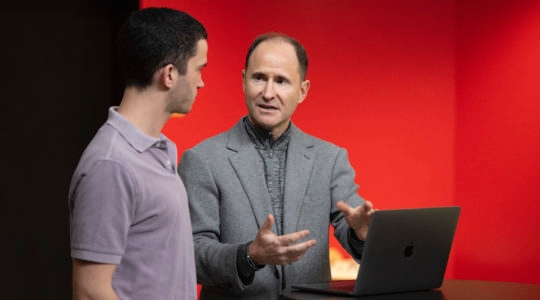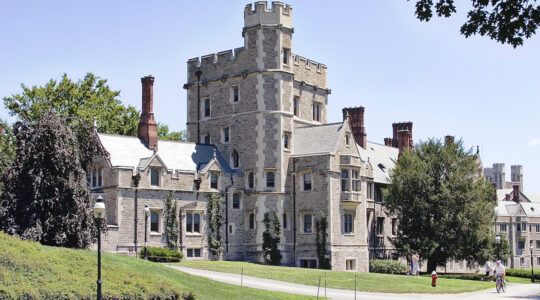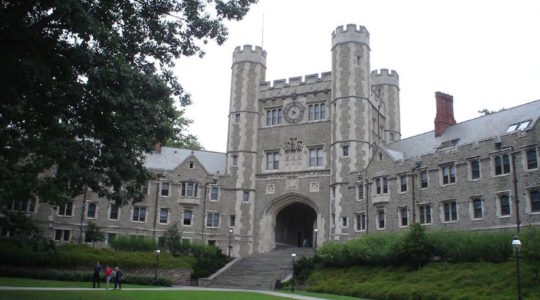
Pro-Israel students at UCLA distributing material during Israel Peace Week, March 2012.
(Hasbara Fellowships)

Students from the University of Georgia manning a table during Israel Peace Week providing information about Israel, March 2012. (Hasbara Fellowships)
WASHINGTON (JTA) — Jewish student leaders may be strident in their Israel advocacy, but they are tolerant in defining pro-Israel activism and diverse in their political views.
Those are among the major findings of a new survey being billed as the first major study of North American young adult leaders involved in pro-Israel advocacy.
Of the 4,000 or so Israel advocates age 30 and younger who were surveyed, 87 percent said they welcomed “multiple perspectives” on the pro-Israel spectrum. Ideologically speaking, 45 percent self-identified as either politically liberal or slightly liberal; 30 percent said they were conservative or slightly conservative; and 21 percent called themselves moderate. Four percent said they were extremely conservative and 2 percent said they were extremely liberal.
The respondents came from diverse religious backgrounds, too: 37 percent said they were Conservative Jews, 27 percent Orthodox, 18 percent Reform and 16 percent “other Jewish.”
The study, titled “Next Generation Advocacy: A Study of Young Israel Advocates,” was released this week by the Charles and Lynn Schusterman Family Foundation. It was conducted by Ezra Kopelowitz and Daniel Chesir-Teran of Research Success Technologies.
“There’s a sense that young advocates come from a particular political persuasion, that they’re shrill and that there’s polarization,” Lisa Eisen, the director of the Schusterman Foundation, told JTA. “They are very diverse, sophisticated and non-ideological, which is not something that most people would imagine.”
Divisive activists are part of the spectrum, Eisen acknowledged, but they “are way out on the margin.”
Those surveyed were leaders of such organizations as Alpha Epsilon Pi fraternity, the American Israel Public Affairs Committee, Hillel, iCenter, the Israel on Campus Coalition, Moishe House, The David Project, Write On For Israel, Hasbara Fellowships, MASA Israel Journey, Stand With Us and the BBYO group for teenagers.
The study also pointed to a relatively high correlation between participation in Birthright Israel, the free 10-day trip to Israel for young adults, and Israel activism: Some 26 percent of the pro-Israel leaders surveyed were Birthright alumni.
Pro-Israel activist Samantha Vinokor, 22, said she discovered early on that there is no single profile for pro-Israel activism.
“You don’t need to be religiously observant because you can connect in your own way, and you don’t need to be politically aware because you can connect culturally or through food or in other ways,” said Vinokor, who was active in pro-Israel groups at the University of Pittsburgh before enrolling in a master’s program at the Jewish Theological Seminary of America in New York and landing a job as director of communications for the World Zionist Organization.
“The pro-Israel movement can give so many different people a home,” she said. “That’s something that I tried to bring onto campus and that I bring to my professional life as well.”
Eisen said the study debunks some myths about who pro-Israel activists are and what they believe, while also revealing some shortcomings in how pro-Israel activists are mobilized in American Jewish life.
While 85 percent of high school seniors and 66 percent of college seniors said they wanted to continue pro-Israel work after graduation, only 27 percent and 33 percent, respectively, reported being asked to do so by a Jewish organization.
“The motivation is there, the passion is there, the interest is there,” Eisen said. “We just haven’t fully tapped the potential.”
JTA has documented Jewish history in real-time for over a century. Keep our journalism strong by joining us in supporting independent, award-winning reporting.





